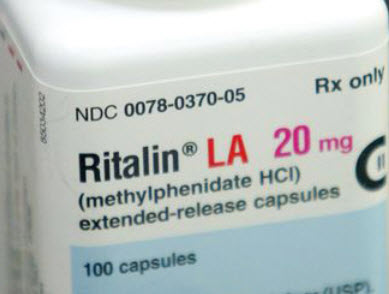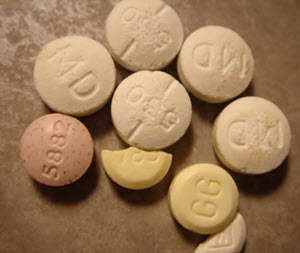 Methylphenidate is a central nervous system stimulant used in the treatment of attention deficit hyperactivity disorder (ADHD) and narcolepsy. It is sold under various brand names, including Ritalin, Concerta and Daytrana.
Methylphenidate is a central nervous system stimulant used in the treatment of attention deficit hyperactivity disorder (ADHD) and narcolepsy. It is sold under various brand names, including Ritalin, Concerta and Daytrana.
Methylphenidate increases stamina and endurance primarily by inhibiting the reuptake of dopamine the central nervous system. Methylphenidate’s mechanism of action involves the inhibition of catecholamine reuptake, primarily as a dopamine reuptake inhibitor. Methylphenidate blocks the dopamine transporter and the norepinephrine transporter, which in turn leads to increased concentrations of dopamine and norepinephrine within the synaptic cleft. Increased concentrations causes increased neuro-transmissions of dopamine and norepinephrine.
Methylphenidate is also a 5HT1A receptor agonist, but only a weak one.
Medical uses
- Methylphenidate is commonly prescribed to treat ADHD.
- Methylphenidate is prescribed to treat narcolepsy, a chronic sleep disorder.
- Methylphenidate is also prescribed for off-label use in treatment-resistant cases of bipolar disorder and major depressive disorder. In patients with major depressive disorder, it is sometimes used in addition to antidepressants.
In the United States, methylphenidate was first licensed by the US Food and Drug Administration (FDA) for the treatment of hyperactivity in 1955. Since the 1990s, the drug has been increasingly prescribed to treat ADHD.
In 2013, 2.4 billion doses of methylphenidate was prescribed globally. This was a 66% increase from 2012. The United States accounts for roughly 80% of global consumption.
Using methylphenidate to enhance performance in healthy adults
 Methylphenidate can be used to enhance performance in normal healthy adults that have not been diagnosed with ADHD, narcolepcy or similar. Unsurprisingly, this use is highly controversial. For instance, Barbara Jacquelyn Sahakian, Professor of Clinical Neuropsychology at the University of Cambridge, has argued that healthy students using methylphenidate may get an unfair advantage in examinations. This is because methylphenidate can enhance mental abilities and improve concentration.
Methylphenidate can be used to enhance performance in normal healthy adults that have not been diagnosed with ADHD, narcolepcy or similar. Unsurprisingly, this use is highly controversial. For instance, Barbara Jacquelyn Sahakian, Professor of Clinical Neuropsychology at the University of Cambridge, has argued that healthy students using methylphenidate may get an unfair advantage in examinations. This is because methylphenidate can enhance mental abilities and improve concentration.
John Harris, an expert in bioethics, argues that it is unethical to prevent healthy people from taking methylphenidate. According to Harris, it is against human enhancement to not use the drug to improve people’s cognitive abilities.
In 2015, a systematic review and a meta-analysis of high quality clinical trials found that therapeutic doses of amphetamine and methylphenidate result in improvements in cognition in normal healthy adults. This included improvements in working memory, episodic memory and inhibitory control. The improvements were modest yet unambiguous.1 2
Recommended reading
Malenka RC, Nestler EJ, Hyman SE (2009). “Chapter 13: Higher Cognitive Function and Behavioral Control”. In Sydor A, Brown RY. Molecular Neuropharmacology: A Foundation for Clinical Neuroscience (2nd ed.). New York: McGraw-Hill Medical. p. 318. ISBN 9780071481274.
Excessive doses and cognitive ability
Excessive doses of methylphenidate can interfere with working memory and cognitive control. Side effects that impair performance can occur.
Short facts about methylphenidate
| Examples of trade names |
|
| Routes of administration |
|
| Pregnancy category |
|
| Legal status |
|
| Formula |
C14H19NO2 |
1Spencer RC, Devilbiss DM, Berridge CW (June 2015). “The Cognition-Enhancing Effects of Psychostimulants Involve Direct Action in the Prefrontal Cortex”. Biol. Psychiatry. 77 (11): 940–950.
2Ilieva IP, Hook CJ, Farah MJ (January 2015). “Prescription Stimulants’ Effects on Healthy Inhibitory Control, Working Memory, and Episodic Memory: A Meta-analysis”. J. Cogn. Neurosci. 27: 1–21.

